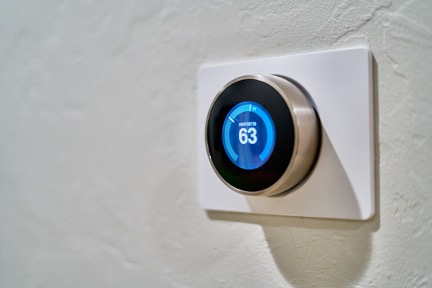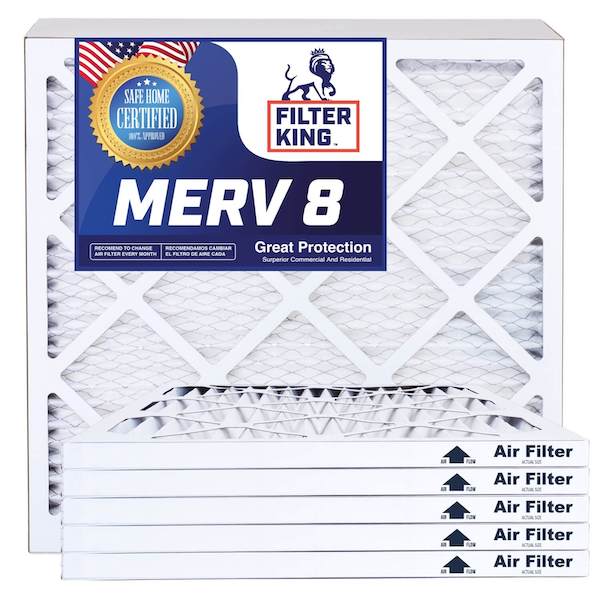Can You Cut an Air Filter to Fit?
It’s pretty easy for homeowners to remember to perform maintenance to household appliances they see inside the home every single day. Heating, ventilation and air conditioning (HVAC) systems are a little more off of the routine radar, but it is essential to keep them maintained and clean. The easiest way to do this is to ensure you swap your air filter out regularly.
Depending on the type of air filter, it is recommended that most homeowners change their air filters every 30 to 90 days. If a home uses a fiberglass air filter, experts say to swap them out every 30 days, but more advanced quality filters can be changed every three to six months. Households with pets, people with allergies, or homes with children should change their filters more often than households without.
The rate at which the air filter is used also impacts how often it needs to be changed. In climates where air conditioning (AC) systems are only needed a few hours per day, the filter will last longer than those homes that run AC nearly 24 hours per day. The size of a home also impacts the frequency an air filter needs to be changed. Larger homes require the HVAC system to run more in order to cool or heat the home, so the air filters will need replacing sooner than in smaller homes.
Quick Shop: Air Filter Size How an HVAC Air Filter Works
The HVAC air filter's primary function is to remove various contaminants from the air, ensuring they don't enter the home or HVAC system. Normal air contains dust, dander, pollen, mold particles, dirt, fibers, and more. Not only can these contaminants negatively affect the humans in the home, they are damaging to the quality and longevity of the HVAC system.
Air filters use a layered design to filter out contaminants before they reach your HVAC system. Filters generally have a pleated material with a greater surface area to trap particles. Then there are other layers to increase the capturing capabilities. As air is pulled through an HVAC system’s blower, filters capture contaminants and particles before the air is pushed through the ducts.
Answering the Question: Is it okay to cut an air filter to fit?
Air filters come in various sizes. It is important that a filter is properly sized to fit an HVAC duct. If a filter is too small or too large, it will not seal properly to the opening, meaning particles can travel through the system into the home or building’s indoor air.
Air filters come in several thickness options: 0.5-inch, 1-inch, 2-inch, or 4-inch. Each of these options then have countless length, width, and height size combinations to choose from.
In addition to the dimensional size, it is important to understand the Minimum Efficiency Reporting Value (MERV) rating of air filters. MERV ratings are the HVAC’s industries way of measuring how well an air filter will capture and filter particles through the system. The higher the MERVE rating, the better the air filter will filter the air.
With so many air filter sizes to choose from, many of us have often found ourselves in this predicament; buying a filter that ends up not being the right size for our HVAC duct system. Is it okay to cut an air filter to fit? Well, it can be done, but keeping a few key stipulations in mind is important.
Will the Filter Withstand the Change?
Some air filters can lose their structural integrity and effectiveness if cut, especially if the person cutting it is inexperienced with air filters. Air filters that are cut improperly, or filters that will not withstand the structural change, can lead to improper performance and damage to the HVAC system.
Manufacturer Instructions
As with any household appliance, it is important to read and understand the manufacturer's instructions and guidelines before deciding to cut an air filter. Some manufacturers will include a clause on their instructions that states it is okay to cut the filter, while others do not. If there are no instructions for cutting the air filter, or if the instructions advise against it, it is best to opt away from making cuts.
Why Air Filtration is Important
Air filtration is important for several reasons. As mentioned above, air filter’s job is to protect both the HVAC system and the people in the home or business from harmful contaminants.
Protecting the People
The quality of air inside a home may not be extremely noticeable right away, but over time, bad quality air can lead to negative health effects. If anyone in a home is experiencing coughing, congestion, sneezing, or other cold-like symptoms, it is a good idea to check the quality of the air filter.
Protecting the System
No homeowner wants to take on the expense of a broken HVAC system any sooner than anticipated. Air filters that are not changed frequently enough can become clogged with dirt, dust, or other particles. This makes the HVAC system work harder and runs more frequently as it tries to push air through the clogged filter. Any HVAC system that runs longer or more than usual will experience early onset wear and tear.
Types of Air Filters
HVAC systems and air filters come in numerous shapes, models, and sizes. This makes it a tedious task to match air filters to a system, ensuring it fits properly. Here are some common types of air filters:
· Flat-panel air filters: These are a traditional option that is relatively inexpensive, but often ineffective compared to other options on the market.
· Pleated air filters: Pleated filters are similar to flat filters, but they have a pleated layer or two to provide more surface area of filtration.
To Put it Simply
As we can see, properly fitting air filters are vital to both the health of the inhabitants in the home and the HVAC system itself. With many different options on the market, it can be overwhelming to make the right selections. Homeowners should consider opting for a custom air filter to ensure the filter will be a perfect fit, leading to a perfectly healthy home and HVAC system.

 14x18x1
14x18x1
